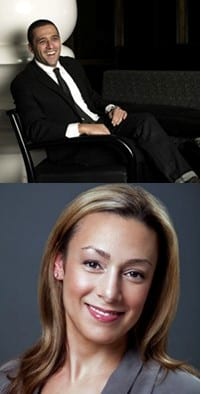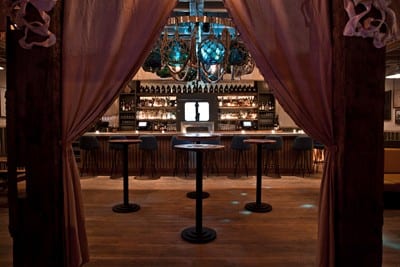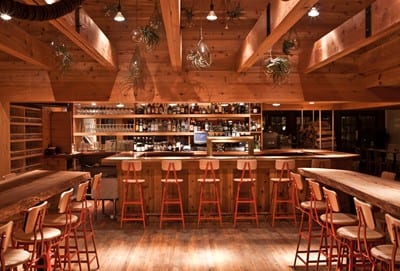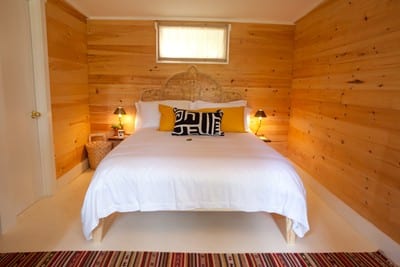Right Stuff
A Q&A with Ben Pundole and Heather Maloney, King & Grove
By Stacy Shoemaker Rauen
 There’s a new lifestyle hotel brand on the block. But don’t expect trendy, modern hotspots. In fact, with King & Grove’s approachable, comfortable, and locally driven mentality, the brand is anything but. Founded by Morgans Hotel Group alums, former CEO Ed Scheetz and VP of entertainment Ben Pundole, the hotel impresarios have already made their mark in Montauk, Long Island, with surfer hangout Surf Lodge and the more recent summer camp-inspired Ruschmeyer’s. Next up: hotels in Brooklyn, South Beach (they will manage and renovate the Tides), and downtown LA, with a plan to open eight to 10 in the next five years. Here, Pundole and King & Grove’s VP of design Heather Maloney (also an ex Morgans staffer) discuss achieving that perfect balance, crafting experiential service, and getting back to the basics.
There’s a new lifestyle hotel brand on the block. But don’t expect trendy, modern hotspots. In fact, with King & Grove’s approachable, comfortable, and locally driven mentality, the brand is anything but. Founded by Morgans Hotel Group alums, former CEO Ed Scheetz and VP of entertainment Ben Pundole, the hotel impresarios have already made their mark in Montauk, Long Island, with surfer hangout Surf Lodge and the more recent summer camp-inspired Ruschmeyer’s. Next up: hotels in Brooklyn, South Beach (they will manage and renovate the Tides), and downtown LA, with a plan to open eight to 10 in the next five years. Here, Pundole and King & Grove’s VP of design Heather Maloney (also an ex Morgans staffer) discuss achieving that perfect balance, crafting experiential service, and getting back to the basics.
HD: Why did you want to create King & Grove?
BP: The idea was to create something that was very accessible; something small with a food and beverage component, design driven with a little nightlife that was not the primary focus of the property, but something that included these things that was also quite nostalgic. And I know that’s somewhat of a trend right now, certainly with the Bowery and Ace hotels, but I think it works. The boutique hotel vision of the nineties and noughties, with a wow factor and minimalist design and slick service, it’s not really relevant any more. The generations below us see straight through that and it’s not very attractive. We grew up when boutique hotels didn’t exist, and so when they came to market, we were fascinated by them and thought they were the coolest things in the world and that Ian Schrager was this guru. There’s been so many imitators, I think, naturally, that the hotel world has changed so much, and I don’t think just because a hotel has a design focus or a nightlife entity it can be called a boutique hotel any more.
HM: Boutique has been watered down so much because you have twelve hundred-room hotels calling themselves boutique, as well as fifty-room hotels. So there’s just no substance behind it any more, and I think that what we’re trying to do is obviously get away from that title, and really develop something that has more substance and depth to it, that’s going to be a more timeless brand instead of one that is going to date with each decade. I think the way that we anticipate designing the interiors is really more with a sense of history, a sense of timelessness, but mixing that with eclectic, worldly intent.
BP: And at the same time, having a connection to the local community.
HM: Absolutely.
BP: And to have food and beverage offerings that are honest and aspiring, rather than these destination restaurants. People who do that well are the Standard [in New York]. There’s no celebrity chef behind it. There’s no partnership there. Same with Gemma at the Bowery [in New York]. They do the food and beverage themselves. We want to do a similar kind of thing. The idea is to try and position ourselves slightly under the radar, and hopefully that will drive a lot of longevity. There are certain hotels that do that really well, like [Manhattan’s] Greenwich Hotel or the Crosby. And their rates are great, and people love them. There’s a generation that looks at some of the boutique hotels of the past fifteen years, and they’re not appealing any more. They’re not really relevant to the new generation; the new generation wants something different, a little more comfortable and substantial, but at the same time, a place that has everything-a design focus and the nightlife entity. But that’s just expected now. If we can do the food and beverage, the design, the community spirit, the kind of global influences, I think we could get it right.
HM: It’s difficult because I don’t think, as a brand, that there really is a singular descriptor to it. Because we really feel like we will be branching out and really curating each of our properties to the neighborhood, so they will all be slightly different. But one of the special things that we have going for us is that you’re not going to be able to knock us off because it’s not going to be so overdesigned that people will want to copy us. It’s going to be very familiar. People will be very comfortable within each of our properties, and it’s not going to be such high design that we’re going to be knocked off by properties trying to get that customer base.

HD: Besides New York, where else do you see this brand?
BP: To begin with, national gateway markets: LA, Miami, Chicago, San Francisco. Cities we know. I would love to do London at some point. It could be a brand that works very well in European markets, whereas I think sometimes the U.S. versions of the boutique hotel don’t really translate to Europe, because maybe they are too slick. And Europe doesn’t really embrace that, whereas I think this brand could very easily do that.
HM: Right. It’s more personal.
HD: How did you come up with the name King & Grove?
BP: Rob [McKinley, who designed Surf Lodge and Ruschmeyer’s] grew up on King Street and I grew up on Grove Road, and it was the kind of intersections of our experience, and ability and vision, and it sounded quite regal.
HD: It does sound regal. So why now? Why did you think it was a good time to launch the brand?
BP: We had been working on it for a year and a half before it happened. I just could see that the King & Grove model would be more relevant. I looked at what other people were doing well, and wanted to take a similar kind of model and do it even better. And also I moved to Williamsburg, Brooklyn, and my life changed a little bit as well. I’m in my late thirties now, and I thought there’s more to it than just nightlife and parties.
HD: Is Ruschmeyer’s a good example of what the brand will be?
BP: We’ve managed to explore every facet of our philosophy, from the kind of immersive service to the honest and aspiring food and beverage, to the kind of design and nightlife entertainment without any being the primary focus. One of the things that I think always suffered in boutique or lifestyle hotels was service. We are doing what we call immersive service, and whether you’re at Ruschmeyer’s to have a quiet spa-like weekend, or you want to go and rage and party with hundreds of friends, we want to be able to cater as much to each group as possible, making it as seamless as possible. So we made sure we knew where all the local yard sales were, that we could set you up with the best kite surfing instructor, that we could have you partying till 4:00 in the morning, so there’s this whole kind of fully immersive experience, and you could choose which one you want it to be. And we learned a lot, and I think it worked. If we can carry this philosophy through some bigger properties, it’ll be very personable.

HD: How do you train your staff to create these personable experiences?
BP: It starts before training, in the hiring. We have some very interesting characters, and I think that was the one thing that Ian Schrager, back in the day, used to do really well. He used to hire for personality, and then teach the technical side. I think that got lost a bit along the way. And the leadership has to show that it’s hospitality. A lot of people who bought into the boutique hotel world over the last few years, if you mention the word hospitality to them, they go ‘Oh, no, I’m in the hotel world. Not hospitality.’But it’s hospitality. It’s service. One of the main focuses of King & Grove is to give some truly hospitable experiences.
HD: Can you share some of the highlights of the design of Ruschmeyer’s?
BP: The nook, which is a kind of breakfast area that is also like a general store that became this very cool, all-day hangout that we’re now going to integrate into as many properties as we can. And there’s Rob’s genius idea of these long, central tables with a removable divider in the middle that he said, ‘When I was young, my parents used to take me to Friendly’s in Montauk, where fourteen tops would just turn up and say, Do you have a table for fourteen?’And now we say, ‘Well, actually, we just might.’

HD: Who will be your typical guest?
BP: The person who wants to be just slightly under the radar.
HD: So I take it no velvet rope?
BP: No, not at all. I learned my lesson.
HM: It was successful then. It’s a new time, and it doesn’t really call for a velvet rope any more. It’s more of an inclusive environment, and if you know about it, then you’re at the right place.
BP: Democratic exclusivity. At Ruschmeyer’s we have a bar called the Electric Eel, and it was called the Electric Eel in the seventies. So we brought it back and we have DJs, and sometimes parties will go on till 4:00 in the morning. But we have our friends DJing. There is no velvet rope, no table reservations. It is first come, first served, all in. I was approached by numerous big name DJs who wanted to come and play for free and I just didn’t want to do that kind of thing. And so we had this great music philosophy of no dance music, no new hip-hop, and no Top 40. It was kind of fifties, sixties, seventies, reggae, rock, soul, nineties, Brit-hop. I mean, it was really good fun. And I think people enjoyed it. It was great seeing all that. Even the local fisherman guys, they come in at 6:00 or 7:00, and they’re welcome. Everyone’s welcome. Then all of a sudden they’re dancing to ‘Like a Prayer.’ Hilarious.
In the past, the hotel industry’s been poorly, unevenly weighted. Design has played a massive focus on nightlife. It’s played a massive focus on destination. The restaurant has played a huge focus. Bring everything to a balanced sense and you’ve got something that can’t not work.
HM: It shouldn’t be over focused in one direction because then you lose sight of everything that really makes a hotel successful. That’s what we’re going to achieve with the brand-just giving everything the appropriate balance to make it right.


